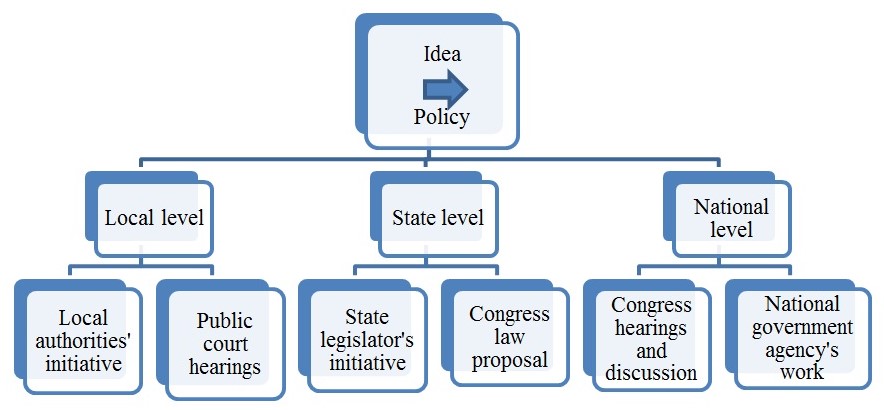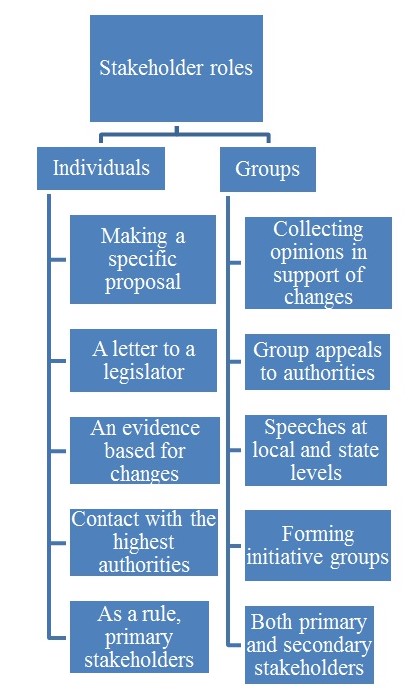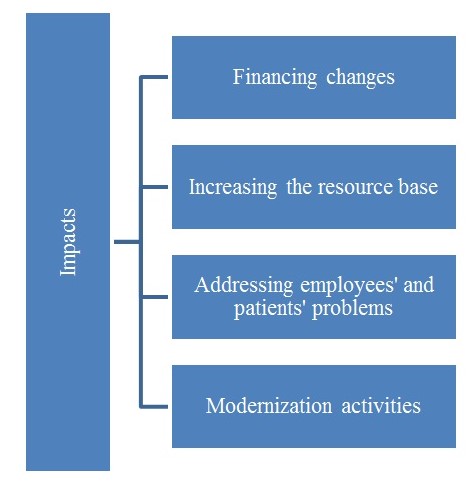Transforming the national health system is a phased process that goes through a series of stages to initiate and approve relevant changes. In many cases, ideas are the background for the implementation of specific initiatives at the local, state, and further, national level. The role of both individuals and groups in this process is significant and may affect the nature of activities. In relation to the nursing home industry, such a complex practice also has implications, and this healthcare area is largely dependent on the features of policymaking procedures. This work aims to visually reflect the stages and principles of the adoption of healthcare policies at different levels and with different stakeholders and demonstrate the impacts of this work on the nursing home industry.
Law and Regulation Process
The principles of transforming a specific idea to change healthcare legislation can go through several stages presented in Figure 1. To begin with, according to the World Health Organization (2016), relevant initiatives are taken either by the local authorities or judicial commissions during hearings. Further, as Porche (2017) notes, state governments prepare material for congressional hearings. At the final stage, the Congress makes a specific decision and appoints a responsible healthcare agency for its implementation.

Stakeholders play an essential role in promoting specific changes, and their roles are presented in Figure 2. Individual stakeholders are usually primary and pursue personal interests (Porche, 2017). They turn to policymakers and look for a sound basis. Group stakeholders can have the status of both primary and secondary ones (Porche, 2017). They form initiative teams and collect opinions in support of changes in the current system.

Nursing Home Industry Process
Healthcare policies for nursing homes are formed through state sponsorship. According to Chen and Taylor (2016), this sector is a “costly segment of the US health-care industry,” and in 2016, “over 95% of all U.S. nursing homes” were providers working under Medicaid certification (p. 5). Statutory requirements regulate this area, and relevant boards provide evidence-based practices (Department of Health, 2015). In addition, specific arrangements are discussed with stakeholders (residents, relatives, and employees) to ensure safe and relevant policymaking standards (Department of Health, 2015). In Figure 3, the principles are reflected in how a corresponding healthcare policy is produced, and in Figure 4, the impacts of this policy on the nursing home industry are demonstrated.


Conclusion
The principles of the development and implementation of healthcare policies at different levels and involving different stakeholders prove the complex nature of the existing system. The influence of individual decisions and interventions contributes to transforming industries and implementing new opportunities. A sound basis, systematic audit, and interaction with the authorities are mandatory aspects of any change practice engage policymakers to take appropriate measures and correct the current legislation.
References
Chen, C. H. C., & Taylor, M. (2016). An assessment of government regulation on adaptive capability and managerial strategy in US healthcare. International Management Review, 12(2), 5-19.
done in as little as 1 hour
Department of Health, Social Services and Public Safety. (2015). Care standards for nursing homes. Web.
Porche, D. J. (2017). Health policy (2nd ed.). Jones & Bartlett Learning.
World Health Organization. (2016). Strategizing national health in the 21st century: A handbook. World Health Organization.
